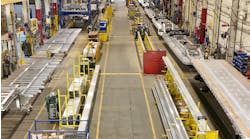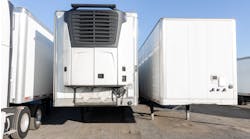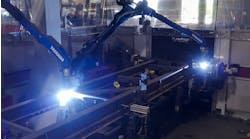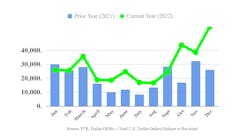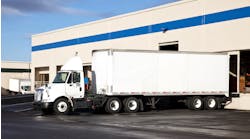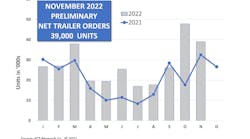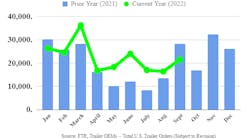Leading builders boost trailer manufacturers output 78% to almost 216,000 trailers in 2011
The 25 largest truck trailer manufacturers (plus four) increased output 78% to turn out 215,815 trailers in calendar year 2011.
Last year's production is almost equal to the 218,422 trailers that the top 25 built in 2007. But as strong as production was in 2011, it was still some 67,000 trailers below the boom year of 2006 during which the top 25 manufacturers produced 282,750 trailers. The trailer industry is still 24% below its pre-recession peak.
The results of Trailer/Body Builders annual survey of the largest truck trailer manufacturers in North America show that the six most productive manufacturers as a group increased their output 89%. These six builders are mainly van trailer producers, and they manufactured more than three-fourths of the total output by all 29 companies that participated in the survey.
Large fleets of for-hire carriers were the driving force behind the trailer buying improvement in 2011. Food carriers also continued to purchase refrigerated trailers, but reefer vans were not as dominant in the purchasing picture as they had been during the previous year.
Platforms and construction trailers made a big comeback in 2011. Some platform manufacturers more than doubled their output, after being the hardest hit sector during the recession. Intermodal equipment also emerged again from dormancy. Three trailer manufacturers built a total of 14,106 container chassis and 1,028 domestic containers. (Containers have no running gear and so are not counted as trailers in this survey.)
This Trailer/Body Builders survey is made by personally telephoning a member of the management team at each trailer manufacturing company. The ranking of the companies by the number of trailers manufactured or shipped does not necessarily reflect the relative success of the companies in terms of profitability or revenue received. The dollar value of a trailer can vary greatly depending on complexity of design, type of construction, materials used and quality level.
The trailer totals reported here cannot be compared directly with other domestic surveys that do not also include some Canadian and Mexican trailer assembly plants, nor does this survey attempt to cover the many small trailer manufacturing companies located throughout North America.
-
Wabash National Corporation almost doubled its trailer shipments — again. It shipped 46,526 truck trailers, an 87% increase over 2010, when it sold 94% more trailers than in 2009.
The company ended the 2011 year strongly, putting out 13,600 trailers in both the third and fourth quarters. Shipments in the first half of 2011 were 8,900 in the first quarter and 10,400 in the second quarter. The growing demand at midyear required ramping up and hiring more employees.
Wabash did double its shipments of both dry freight vans and platform trailers. It shipped 40,3l5 dry vans, up 103 % over 2010. Another 4,182 vans were refrigerated, an 8% increase. Platform shipments were doubled to 1,980 trailers. The company also shipped 49 dump and specialty trailers.
Converter dolly shipments were very high at 1,059, but these units are not complete truck trailers and so are not counted in the trailer total. If they were, Wabash's total unit count would have been 47,585.
Looking ahead, Dick Giromini, president and CEO, forecast building 50,000 to 56,000 trailers in 2012. “We are sold out for the first quarter and have limited slots available in the second quarter.”
“This healthier demand environment, coupled with a strong backlog of approximately $587 million as of December 31, 2011, reaffirms our belief that we remain in the early stages of a trailer replacement cycle, which we believe could be one of the strongest in history.”
With quoting activity higher than at this time last year, the stronger demand is causing the company to “aggressively pursue improved pricing” to pass through the increasing cost of materials and components. “All manufacturers are raising their prices to recapture and recover lost margins. We are taking the lead. We are in recovery mode.”
Wabash National also announced the successful start-up of its diversification into frac tanks as used in the oil and gas drilling industry. After building 262 of these water reservoirs on a single trailer axle, the company is planning to build about 550 frac tanks in 2012.
-
Great Dane Limited Partnership increased trailer shipments in 2011 by 86%, reaching the 39,000 level. This is 65% of the most recent high point of 60,300 shipments, reached in 2006, when Great Dane ranked number one of the top 25 trailer manufacturers.
The majority of the 39,000 trailers in 2011 were dry freight vans, followed by refrigerated vans and platform trailers. Great Dane's new refrigerated van trailer plant in Statesboro, Georgia, is scheduled to start trailers down the line in April, 2012. With a capacity of 5,000 reefers per year, this new plant will boost the refrigerated trailer capacity at Great Dane by about 50%.
-
Utility Trailer Manufacturing in City of Industry, California, increased output by 43%, building 33,289 truck trailers. This includes 18,244 refrigerated van trailers, a 33% increase, and 12,783 dry freight vans, a 45% increase over 2010. Platforms and curtainsider production more than tripled to 2,262 units.
Craig Bennett, senior vice-president, sales and marketing, says Utility Trailer is looking for a 20% to 25% increase in 2012, and for this they have been expanding production facilities. The Virginia dry freight plant now has a second assembly line to handle more specialized trailer options.
Expansion of the refrigerated trailer plant in Virginia will reflect the need for more specialty options such as load temperature monitoring, and running the power lines through the floor, as well as adding side doors, compartment dividers, lifting tailgates and side gates in food service trailers.
-
Hyundai Translead more than doubled its production of van trailers and container chassis, according to Brett Bartels, deputy general manager of sales and marketing strategy. Dry van production was 16,433 trailers, up 143%. Refrigerated trailers numbered 1,111 in 2011, up 18%. Vans and reefers together totaled 17,544 trailers, a 128% increase.
Container chassis production was 7,806, up 70% over 2010. Hyundai Translead also built 828 domestic containers, a 118% increase, and 1,039 converter dollies, an 82% increase. Both the domestic container figures and converter dolly numbers are not counted in the 25,350 total of truck trailers. If they were, the total number of units would be 27,217, which is a 121% increase over 2011.
Hyundai Translead is headquartered in San Diego, California, and its three manufacturing plants are located across the border in Tijuana, Mexico. It is a wholly owned subsidiary of Hyundai Motor Company Korea.
-
Stoughton Trailers LLC more than doubled output at its three plants in Wisconsin, thanks in part to a return of the market for container chassis and domestic containers. The Stoughton plants in Stoughton and Brodhead, Wisconsin, built 9,200 dry freight van trailers and grain trailers, a 71% increase over 2010.
The Stoughton plant in Evansville, Wisconsin, was reopened in May 2011 and built 2,800 container chassis. It also started ramping up domestic container production with an order for 200 of the big boxes. (Containers are not counted in the trailer total).Total trailer output at Stoughton Trailers was 12,000 units, a 123% increase over 2010.
“We are continuing to add more people,” says Bob Wahlin, new president of Stoughton Trailers. “We think 2012 will be another good year.”
-
Vanguard National Trailer Corp in Monon, Indiana, assembled 8,184 truck trailers, a 72% increase over 2010. These include 7,064 dry freight vans, a 57% increase, and 1,120 refrigerated vans, more than four times the number of reefers built in 2010.
Vanguard is on track for a big year in 2012, but is facing capacity limits. “We are already sold out through October,” says Charlie Mudd, president of Vanguard National. “Our limit is 8,000 dry freight vans and 2,000 refrigerated trailers.”
Vanguard side panels, roof assemblies, and floors are made in China and shipped to the Vanguard plant in Monon, Indiana, for assembly. The completed vans are then trailerized with locally produced running gear.
-
MANAC in St. Georges, Quebec, increased production 59% over its 2010 level, turning out 6,500 truck trailers. MANAC's headquarters plant in Canada builds a full line of trailers from dry freight vans and platforms to forestry equipment. At its two plants in the United States, it produces bottom dump trailers in Kennett, Missouri, and platform trailers in Oran, Missouri. Charles Dutil, president, says they are expecting 2012 to be an even better year in both volume and general business conditions.
-
Strick Corporation more than doubled its output of truck trailers, but much of the increase came from a revival of the container chassis market. Strick built 3,500 chassis at its Berwick, Pennsylvania, plant, 1,500 custom dry freight vans at its Monroe, Indiana, plant, and 200 platform trailers, curtainsiders, and forestry trailers at its Sumter, South Carolina, plant.
Strick's total production of 5,200 trailers is a 112% increase over the number produced in 2010. Looking forward, Ben Katz, marketing manager, says the company is cautiously optimistic that production will remain steady and they can continue to operate full shift at all three plants in 2012, as they did in 2011.
Katz says the rebound in the chassis market is coming from domestic companies, principally railroads and leasing companies. Ninety% of the orders are for the United States and Canada, and often for specialized chassis such as lightweight, high-strength steel chassis to haul heavy containers.
-
Timpte Inc in David City, Nebraska, is in the middle of the booming ag market in the Midwest. A year ago Timpte topped out at 3,770 hopper-bottom grain haulers, and
Its president, Dale Jones, suggested that the ag trailer market might plateau in 2011. It did. Timpte built 3,583 bulk hopper trailers in 2011, down 5%. For 2012 he is thinking the market might be flat.
Two new products introduced by Timpte during 2010 might help make life easier down on the farm and for the truckers that haul for them. One is a new EZ Flow electro-hydraulic grain trap. An electric motor drives a hydraulic pump that powers a hydraulic cylinder that opens or closes the sliding trap. It is remotely controlled from the cab or elsewhere. The other is a tender auger trailer for the fertilizer industry. The trailer hoppers feed into horizontal augers. A vertical auger raises the material to feed into the spreader truck.
-
Heil Trailer International, Co manufactured 3,571 truck trailers in 2011. This includes all tank trailers, lowbeds, and military trailers produced in the United States and overseas. It is 52% more than the 2,350 reported for 2010. Trailers produced at the Heil Trailer plant in Argentina in 2011 numbered 294 and in Thailand, 172.
Formerly a part of Dover Corporation, Heil Trailer was purchased in December 2011 for $220 million by American Industrial Partners. The new chief executive officer is Randall Swift, formerly CEO of Allied Specialty Vehicles Inc., producer of E-One fire and rescue vehicles, Horton Ambulances, Collins school buses, Capacity terminal trucks, Lay Mor street sweepers, and other specialty vehicles.
Bob Foster, president of Heil Trailer for 15 years until retirement in 2006, has rejoined the company as chairman of the board, and Zack Coley is the new vice-president of sales and marketing.
-
Fontaine Trailer Company more than doubled its output of platform and drop-deck trailers in spite of a flat housing market and an April 27 tornado that ripped off the roof and shut down its Haleyville, Alabama, plant for two weeks. Production was shifted to Fontaine plants in Springville and Jasper, Alabama while the damage was cleaned up and repaired.
The final tally was 3,478 steel platforms and drop-deck trailers, including heavy-haul units. This is a 103% increase over Fontaine production in 2010. Hank Prochazka, president of Fontaine Commercial Trailer, says the company has a better backlog than a year ago, and he is optimistic for an even better 2012.
-
MAC Trailer Manufacturing of Alliance, Ohio, had a record year — for profits as well as volume, says Michael Conny, owner. The company built 2,837 aluminum truck trailers, some 81% more than in 2010. Each of MAC's four product lines set new production records. Dump trailers were up 49% to 1,119 trailers (not counting 40 dump bodies). Platforms were up 126% to the 882 level. Pneumatic dry bulk trailer production was four times greater at 516 trailers. Refuse transfer trailers topped out at 309, just above the 2010 mark. The company also built 12 frac trailers.
“The current year 2012 will be even better,” Conny says. “We already have booked more orders than the 2011 production level.”
MAC Trailer now is adding a fifth product line — aluminum liquid tank trailers. The first production coming off the line in late December and early January are water tank trailers used in oilfield drilling and crude oil tank trailers. They are being built in an 185,000 sq ft plant in Kent, Ohio, that MAC Trailer bought in November, formerly an aluminum trailer plant for Fontaine Trailer Company.
-
Road Systems Inc in Searcy, Arkansas, more than tripled output of its new-built, rebuilt and refurbished van trailers in 2011. The company built 50 brand new van trailers, remanufactured 1,439, and refurbished 1,000 others for a total of 2,489. Lynn Reinbolt, president of Road Systems, says remanufacturing and refurbishing are practically the same, but are reported separately because of taxing differences.
Reinbolt says the year 2012 is starting strong, and output could increase 60% to the 4,000 level for all three categories.
-
Polar Tank Trailer LLC of Holdingford, Minnesota, built 2,350 tank trailers, a 38% increase over 2010. Production of pneumatic dry bulk trailers more than tripled, says Ted Fick, president and CEO of Polar Corp. This includes increases in both frac sand trailers used in oilfield drilling and food-grade trailers for flour, sugar, etc. Petroleum trailers also increased, and crude oil tanks more than doubled. Stainless steel tanks have remained strong, in line with 2010 production.
The market continues strong, adds Fick. “We expect production to continue increasing throughout 2012.” The three Polar Tank Trailer plants are located in Holdingford and Opole, Minnesota, and Springfield, Missouri. Polar also has the largest network of company-owned cargo tank trailer service and repair shops, covering over 30 locations nationwide.
-
Walker Group Holdings LLC manufactured 2,258 tank trailers, a 29% increase over 2010. In addition, it built and assembled 639 tank truck bodies on truck chassis, a 23% increase. Thus, the total for the Walker Group in 2011 was 2,897 tank transport vehicles, up 28% over the previous year, according to Jim Miller, VP-sales & marketing.
The Walker Group includes Brenner Tank LLC of Fond du Lac, Wisconsin; Walker Stainless Steel of New Lisbon, Wisconsin; Progress Tank of Kansas City, Missouri; Garsite LLC of Kansas City, Kansas; and Bulk Tank International, near San Jose Iturbide in central Mexico.
-
Trail King Industries of Mitchell, South Dakota, built 1,892 truck trailers, a 29% increase, plus another 253 light duty trailers with axles under 10,000 lb capacity, which are counted separately. The unit total of light and heavy trailers is 2,145, according to Chuck Noel, vice-president, administration‥
The biggest share of Trail King production is in lowbed and specialized heavy haul trailers, including extendable trailers, step platforms, hydraulic tail and tilt deck trailers, totaling 1,133 units. Dump trailer production including end dumps, bottom dumps and live bottom trailers totaled 500 in 2011. Pneumatic dry bulk trailers numbered 259.
Trail King operates two manufacturing plants — a new plant in West Fargo, North Dakota, and the headquarters plant in Mitchell. Since October 2110, Trail King has been a part of CC Industries Inc of Chicago, William Crown, president and CEO.
-
East Manufacturing Company in Randolph, Ohio built 1,601 truck trailers, a 63% increase over 2010. These are all-aluminum platforms, drop-decks, dump trailers and solid waste refuse trailers. Their market is nationwide on aluminum platform trailers, while the East dump and refuse trailer market is strongest in the midwestern and eastern states and Canada.
“We are looking for an even stronger trailer market in 2012 — in the 2,200 to 2,400-unit range,” says David de Poincy, president of East Manufacturing. He replaces David Tate, former East president who retired November 1, 2011, after 32 years of service with the company.
-
Reitnouer Inc in Reading, Pennsylvania, increased production of its all-aluminum platform trailers by 65% in 2011, after more than doubling it the previous year. The finally tally for 2011 was 1,539 trailers.
President Bud Reitnouer attributes the growth to recovery in the manufacturing sector (certainly not the housing sector) and to very active dealers in Canada. About 35% of his sales in 2011 were in Canada, which has recovered from the recession faster than in the U.S.
With a strong backlog of orders, Reitnouer is now producing at the rate of 50 trailers a week. He is looking forward to building about 2,500 trailers in 2012, which would represent another 65% increase.
-
Pitts Enterprises of Pittsview, Alabama, built 1,509 truck trailers, a 20% increase over 2010. This includes logging trailers, forestry equipment, and lowbed trailers at the headquarters plant in Pittsview, and dry vans and refrigerated trailers, platform and chip vans from the Dorset Trailer plant in Elba, Alabama. Another division, Dynaweld in Columbus, Georgia, distributes platform trailers and lowbeds.
Jeff Pitts, president and CEO, says he remains optimistic for a continuation of the steady growth in 2012.
-
Kentucky Trailer built 1,469 custom-built van trailers in 2011, a 69% increase over its 2010 production. Most of these are drop-frame vans for the moving and storage industry, but also includes specialized van trailers for parcel delivery companies and other applications.
Kentucky also builds trailer shells that will be fitted out by its Trailer Technologies subsidiary in Walled Lake, Michigan, or by its Kentucky High Tech Performance Trailers subsidiary now located in its Louisville plant. The company has further diversified with a separate painting and decaling center, Kentucky Trailer Paint division, located in an 80,000 sq ft building about a mile from the Louisville plant.
Kentucky Trailer started 2012 with a much stronger backlog than a year ago. Larry Roy, executive vice-president and CFO, says they are expecting a much better year, especially in the first half.
-
Doepker Industries in Anaheim, Saskatchewan, increased production 16% across its broad product line, building 1,100 truck trailers. The agriculture market, egg production, forestry equipment, oilfield, gravel haulers — even commercial flatbed trailers were much better markets in 2011, says Bill Schuler, vice-president of sales and marketing.
“We are very positive about 2012,” says Schuler, “limited only by the ability to hire enough staff.”
-
Kidron of Kidron, Ohio, built 1,094 refrigerated truck trailers, down 4% from 1,142 in 2010, which was a 30% increase over 2009. These are almost all multi-temperature, multi-stop delivery trailers for the food service industry.
“Many of our core customers ordered more of our refrigerated truck bodies this year than trailers,” says John Sommer, executive vice-president at Kidron. All of the refrigerated trailers are built in the company's Montgomery, Pennsylvania, plant which is capable of building foam insulated refrigerated trailers up to 53 feet long.
-
Tremcar Inc, manufacturer of both liquid and dry bulk tank trailers in both Canada and the United States, increased its output 67%, building 978 tank trailers, according to Daniel Tremblay, president. Tremcar operates three manufacturing plants, located in St-Jean sur Richelieu (Quebec) and Toronto, Ontario, in Canada, and in Strasburg, Ohio.
-
Western Trailer in Boise, Idaho, increased production 36% in 2011, building 797 truck trailers. These are mainly bulk commodity trailers for agricultural products and for wood chips and residual wood products, as well as refuse transfer trailers. Tod Swanstrom, engineering manager, says they are planning for another year of growth.
-
Talbert Manufacturing Inc in Rensselaer, Indiana, built 576 lowbed and heavy hauler trailers in 2011, a 26% increase over the previous year. These were almost all commercial orders, while before the recession Talbert was heavily into military contracts.
“We are cautiously optimistic about the 2012, looking for a 15% gain, says Greg Smith, vice-president of sales and marketing. “We are bullish about the positive market forces for construction and getting highway infrastructure work going again, but transportation is still underfunded and the government remains divided on new appropriations.”
-
Felling Trailers of Sauk Centre, Minnesota, built 2,173 trailers in 2011. However, 74% were light trailers with no axle more than 10,000-lb capacity. The other 26% are heavier models with load ratings up to 120,000 pounds. Felling built 566 of these truck trailers in 2011, in both semitrailer and tag configuration. Most are equipment trailers, including hydraulic detachable lowbed trailers.
“Our outlook is for a very strong market this year,” says Pat Jennissen, sales and marketing manager. “We are looking for a 40% to 50% increase.”
-
Doonan Specialized Trailer in Great Bend, Kansas, doubled its 2010 production. In 2011 it built 546 trailers, up 106%, including platforms, drop-decks, extendible platforms, and detachable and fixed gooseneck lowbeds. These include both Doonan and Chaparral brands, after Doonan's acquisition of Chaparral Trailers in May, 2008. Mike Gordy, president, says they are booking orders now at a rate to bring production to over 800 trailers in 2012.
-
Travis Trailers of Houston, Texas, increased production 53%, building 531 aluminum dump trailers, bottom dumps, and refuse transfer trailers. In February 2011, Travis Body & Trailer Inc purchased the assets of Everlite Inc of Longview, Texas, manufacturer of the Alumatech Trailer product line, and moved the assets to Travis' 100,000 sq ft plant in Houston. The Travis Alumatech model was introduced in November. “The super-lightweight Alumatech model will complete our very broad line of aluminum dump trailers,” says Bud Hughes, president of Travis Trailers.

